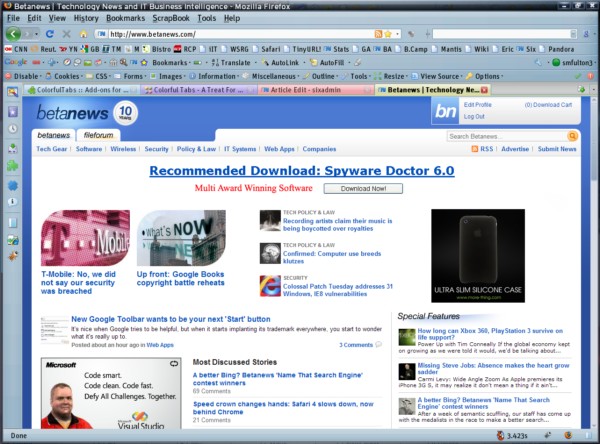
iTunes App store's biggest competitor will be WinMo Marketplace
Even though Apple used the graph shown above at WWDC this week to illustrate the iTunes App Store's dominance in the mobile applications space, it was missing a big contender that could make its presence much less commanding.
During the Digital Downtown Mobile Apps Shootout today, Vice President of Strategy and Analysis at Interpret LLC Michael Gartenberg reminded the audience that more than 25,000 applications have been developed for the Windows Mobile platform, a number slightly greater than Microsoft's estimate late last March. This figure stresses the impact Microsoft's mobile app store could have.

Tomorrow's DTV transition counts 2+ million stragglers
As the United States sits on the threshold of the switch to digital television, we get to see the size of the "lowest common denominator" of television viewers who after more than two years of public discussion still have not readied their old TV sets for the new broadcast standard
The National Association of Broadcasters says that as of June 3, nearly 9 out of 10 broadcast-only households were completely ready for the digital switchover. According to Nielsen market research, the total number of US television households for the 2008-2009 season was 114.5 million, but homes that consume only free, over-the-air signals is just a small fragment of that. According to the SRI Home Technology Monitor quindecennial survey (PDF available here) found that in 2004, 18.9% of households were broadcast only. Using those figures, that would mean an estimated 2.16 million households remain unprepared for the digital switch.

Microsoft to release Windows 7 in Europe without Internet Explorer
Saying that the company must abide by the law of the European Union, Microsoft Deputy General Counsel Dave Heiner revealed Thursday afternoon that it has made the decision to make a European "E" version of Windows 7 available to customers there, without Internet Explorer 8 bundled.
"We're committed to making Windows 7 available in Europe at the same time that it launches in the rest of the world, but we also must comply with European competition law as we launch the product," Heiner wrote. "Given the pending legal proceeding, we've decided that instead of including Internet Explorer in Windows 7 in Europe, we will offer it separately and on an easy-to-install basis to both computer manufacturers and users. This means that computer manufacturers and users will be free to install Internet Explorer on Windows 7, or not, as they prefer. Of course, they will also be free, as they are today, to install other Web browsers."

Top 10 Windows 7 features #1: Action Center
It's a sad fact which even Microsoft itself has stopped denying: The success of Windows in recent years has been despite the fact that the operating system isn't exactly embraced by its users. The percentage of Windows users who love Windows may not come anywhere near the percentage of Mac OS users who love Macintosh. Windows is what comes on most people's PCs.
In the past few months, Microsoft's marketing campaign has cleverly (and finally) diverted attention away from Vista, which on a public relations scale has largely failed to win the public's affection. Instead, you'll notice that the selling point of Windows recently is that it enables you to buy a bigger and better PC. Spend $1,500 or less and you're going to get twice the memory, twice the storage, and much better graphics. The word "Vista" doesn't even appear in the company's advertising. It's an effective argument -- what's more, it's accurate, and it's the strongest argument in Microsoft's favor.

The case for smaller, simpler, faster operating systems
Call me a shameless optimist, but I can't shake the feeling that the operating system arms race may finally be over. After countless generations of new-and-improved OSs that consumed every iota of additional performance built into ever-faster hardware, I think we're finally seeing a tiny light at end of a tunnel many of us thought would continue forever.
Newer, but not better


Cable group to Congress: Don't let ESPN jack up the cost of broadband
The American Cable Association represents small-town network operators, those who serve rural markets or more sparse populations, and speaks out on issues that are of special interest to their subscribers, specifically those issues which could result in increased subscription rates.
The group's latest issue deals with the site ESPN360.com, which features streams that rebroadcast various sporting events. However, if you are connected to the Internet through an un-affiliated service provider, which includes Comcast and Cox, all the streams on the site are blocked. The only official way to get access to the site's content is to switch to an affiliated service provider.

Dell goes direct with Microsoft downloadable software
If you thought Microsoft's partnership with HP in the Laptop Hunters ad series was a notable "outside of the box" relationship, another has shown up today: Microsoft has made its software available as direct downloads through Dell's five-month old online software shop.
This makes Dell the first official non-Microsoft download shop since Redmond opened The Microsoft Store's downloads late last year.

New York to get cash from Symantec and Mcafee
Yesterday, the New York Attorney General's office announced a settlement effectively closing the investigation of McAfee's and Symantec's automatic antivirus subscription renewal practices. Several New Yorkers complained that they had purchased the software online, only to later have their subscription automatically renewed without their knowledge or consent.
In the settlement, McAfee and Symantec have to pay a combined $750,000 to the state of New York, and improve the visibility of their subscription terms and renewal policies so customers won't be caught unawares by recurring charges on their credit cards. This will involve notifying customers both before and after renewal of the subscription and offering a 60 day grace period for refunds.

Casio Exilim Mobile info gives glimpse at tough military testing
Adding phone functionality to a camera, instead of the other way around -- that's not such a stretch these days, which makes Casio's new Exilim Mobile... telecamera? photophone?... interesting rather than a weird outlier. If you want outliers, you'll have to look to the testing process it went through to reach market.
In the process of browsing around the Exilim Mobile site, we noticed that along with the usual tech specifications, Casio lists the MIL-STD-810 tests for which the handset is certified. Those tests -- the Department of Defense Test Method Standard for Environmental Engineering Considerations and Laboratory Tests, to give them their full name -- replicate the effects of the environments gear might encounter during life in the company of a service member. And frankly, the tests sound a lot more fun than the namby-pamby civilian stuff -- never mind voice quality, how does it hold up in a sandstorm?!

Up front: Microsoft no longer needs Money
Microsoft Money was the package that proved Redmond could be beat. The package's failure to best Intuit's Quicken family of personal-finance software may not have directly inspired the likes of Netscape or Google, but the simple fact that one niche eluded Bill Gates' grasp made it evident that it was possible to do so.
Money, Money: Why Microsoft's personal-finance package mattered

Google settles AdWords overcharge spat
A class-action lawsuit served on Google by AdWords advertisers who were charged more than their Daily Budget plan should have allowed, will be awarded up to $20,000 under the terms of a settlement reached this week. Meanwhile, the lawyers who brought the suit were awarded up to $5 million, plus expenses, for their trouble.
The suit covered AdWords advertisers who signed on between June 1, 2005 and February 28, 2009, and who were charged more than their Daily Budget on any day during that period, sometimes by as much as 120%. Advertising resellers are not included in the class. Google files four motions for partial summary judgment in the matter, then chose the settlement route -- admitting no liability or guilt, but apparently deciding that a $20,000,000 settlement was less of a nuisance than continued litigation. (The $20 million was put into an escrow account at the end of March.) Much of the payout will be offered in the form of ad credits for marketers.

'Pre-Father' Jon Rubenstein takes over Palm CEO spot
Palm on Wednesday announced that Jon Rubenstein, the former Apple exec who was lured out of a hammock on a Puerto Vallarta beach to helm the development and launch of the Pre, will step into the CEO role on Friday. Ed Colligan, who led the company for 16 years, will take some time off before joining Elevation Partners, the venture-cap firm instrumental in bringing Rubenstein in.
Mr. Rubenstein got his start at HP, has long been credited with helping to invent the iPod and served as the first head of the company's iPod division. Now known as Apple's "pod-father," he has been aboard Palm since July, but only official as executive chairman since October. Before that, teams of Elevation and Palm execs were making pilgrimages to Mexico to coax him off that beach, as he famously told the crowd at the CES Pre unveiling back in January.

Mozilla and Google add the personal touch to add-on hunting
Widgets and add-ons have been a huge success for computing in general and open standards in particular -- so much so that it can frankly be hard to wade through one's options. (Have you ever clicked clear through the Vista gallery?) Both Mozilla and, more fancifully, Google have a new tactic for addressing the problem.
Mozilla on Wednesday announced Add-On Collections, which allow users to showcase the apps they like best. You can even add comments about why you've chosen what you have.

New Google Toolbar wants to be your next 'Start' button
The latest version of the Google Toolbar, now on version 6 for Microsoft Internet Explorer, remains the most convenient way to expedite searches through the Internet's most versatile search engine. But with each successive version, this one being no exception, Google tries to be a little more "in your face."
With changes coming to the taskbar in Windows 7, users are likely to arrange their running applications differently. Google appears to be taking advantage of this fact with the introduction of its own taskbar button that appears after you install Google Toolbar 6 for IE8. On many Win7 setups, including ours where we've tilted the taskbar vertically, the Google logo now situates itself right alongside Microsoft's, as if to say, "I'm here too."



